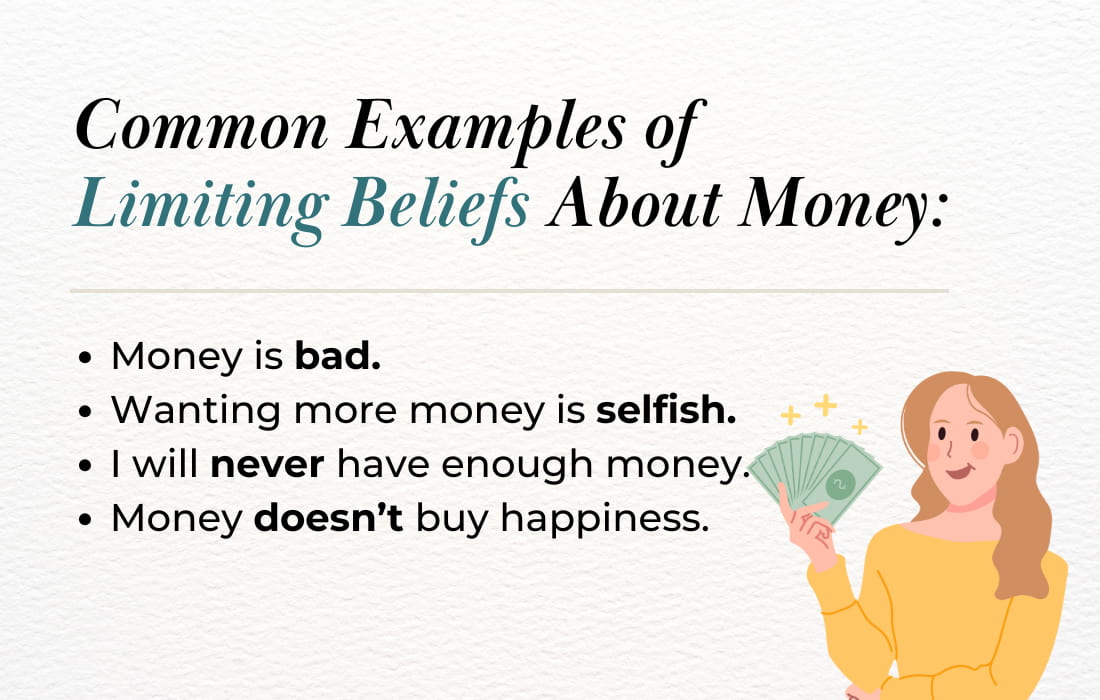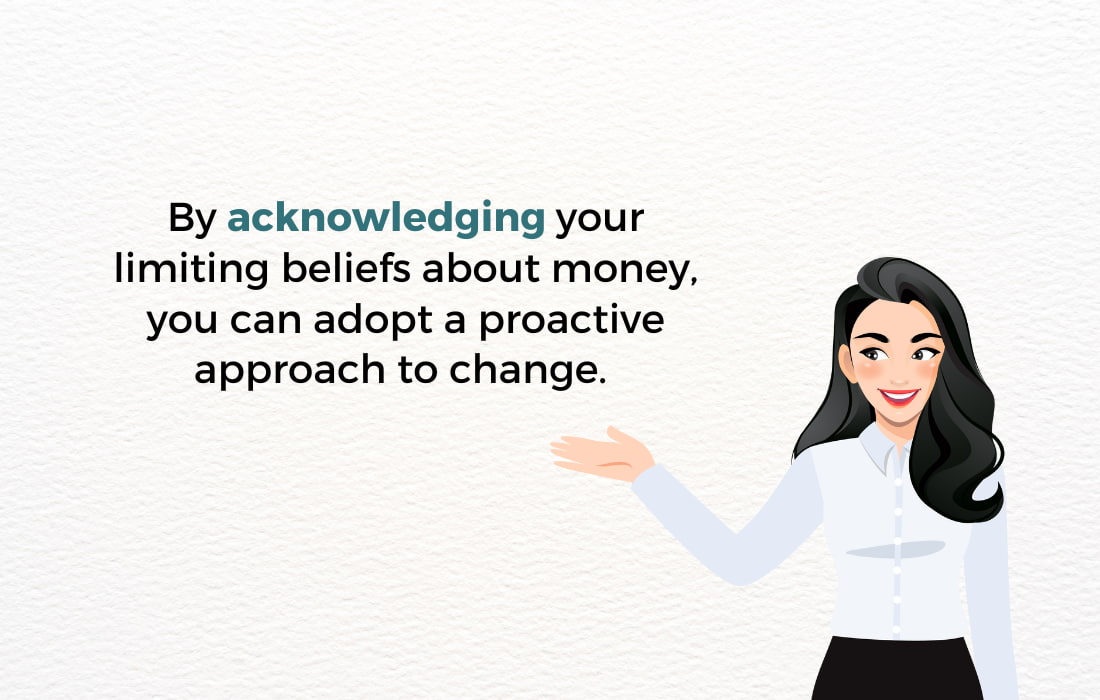Removing Limiting Beliefs about Money
Written By Tiffany Woodfield, Financial Coach, TEP®, CRPC®, CIM®

Let’s talk about how to remove limiting beliefs about money!
To cultivate change, it’s crucial to acknowledge and identify the money beliefs holding you back. Here’s how to get started: take a moment to write down your beliefs about money.
If you’re struggling to generate ideas, here are some common examples of limiting beliefs about money:
– Money is bad.
– Wanting more money is selfish.
– I will never have enough money.
– Money doesn’t buy happiness.
Once you have identified your money beliefs, it’s essential to question whether they are 100% true and if there are situations where they may not hold up.
Limiting Belief Example
For example, let’s look at the limiting belief “I will never have enough money.”
Consider: Is this really true, or is it a self-fulfilling prophecy?
When you convince yourself that you will never have enough, it’s as if you are directing the universe to ensure this becomes your reality. Think of it like typing into your car’s GPS: “I will never have enough money.”
What will happen?
You’ll be led toward experiences that reinforce this belief. Consequently, your perspective becomes limited by a lens of scarcity.
Scary, right?

The Good News
The good news is that by acknowledging your limiting beliefs about money, you can adopt a proactive approach to change.
When you hear yourself say, “I will never have enough,” pause and ask, “Is this really true? How can I create opportunities to have enough money?”
If you’re struggling to find alternative perspectives, try repeating the mantra, “I will have enough money.” It may feel insincere at first, but you’ll gradually notice a shift in your mindset.
Remember, recognizing and changing limiting beliefs is a journey, and every step you take brings you closer to a healthier relationship with money.
Common Questions
How can I feel more confident about my money decisions?
To feel more confident in your money decisions, start by checking out your current financial situation.
Take a close look at your monthly income and expenses to identify any areas where you may be spending on things that don’t genuinely add value to your life.
Remember, the perception of what is “expensive” is subjective and can vary greatly from person to person. By taking the time to clarify your priorities, you can approach money decisions with confidence, knowing that you’re spending on things that are meaningful to you and that you have sufficient cash flow to support those choices.
What’s the best way to set realistic financial goals?
One of the most common mistakes people make is having unrealistic expectations when establishing financial goals.
It’s important to create clear, realistic, and attainable goals, as this helps you experience success and remain motivated to continue!
For example, if you’re aiming to take a vacation that will cost you $5,000, start by reviewing your current spending to determine how long it will take to save that amount. While you’re at it, take time to visualize how wonderful it will feel to enjoy that vacation. Picture yourself relaxing at your destination each night.
This exercise serves as a powerful reminder of why you’re choosing to forgo some instant gratifications in pursuit of your larger goal.

How do I stay motivated to change my beliefs about money?
Staying motivated can be challenging, especially when you don’t see concrete results every day. One effective method is to track your progress in changing negative beliefs into positive ones.
Let’s say you started by believing 100% that “you will never have enough money.” Take the time each week to note the percentage you believe this limiting idea and observe if it has decreased. If it was 100% true in your mind when you started working on your mindset and has now dropped to 80%, celebrate this achievement!
This reduction in the negative belief indicates that this limiting belief holds 20% less power over you. You are starting to create the life you desire rather than feeling like a victim of your circumstances.
Another approach is to consider the cost of not changing your beliefs about money. Recognize that if you don’t change a negative belief, you may live a life of lack rather than abundance. Luckily, you can take ownership of your choices.
How do I replace bad money habits with good ones?
Take a piece of paper and list all the bad money habits that are no longer serving you.
Next, write down a positive habit that can replace each negative one. Choose one or two habits that you want to change the most and make those your focus for the next 30 days.
Once you accomplish this, move on to the next set of habits and repeat this pattern.
How can I avoid falling back into old money habits?
To prevent slipping back into old money habits, keep track of your successes and the consequences of reverting to those habits.
Remind yourself that if you do stumble, it’s important to get back up. Acknowledge that change takes time—the rewards are worth it! Instead of feeling guilty and wanting to hide after a poor financial decision, embrace accountability.
The key to success is being aware of your money habits so you can cultivate better habits that help you create the life of your dreams.
Get the Free Guide and Audio Meditation for Manifesting Your Dreams
Pop your email address in the form below to get my easy checklist and guide to manifesting and the guided audio meditation to help you get started.
You’ll also get one or two emails per month with the latest blog posts about abundance, wealth-building, manifesting, and creating a fulfilling life.
Related Articles
💎 How To Get Your Mind in the Mindset of Saving Money
💎 How to Change Your Mindset on Making Money
💎 22 Limiting Beliefs that Nearly Everyone Has
💎 Money Management Rules: 50 30 20, 7-Day Rule, and 20/10 Rule
About the Author

TIFFANY WOODFIELD is a financial coach, cross-border expert, and the co-founder of SWAN Wealth based out of Kelowna, BC. As a TEP and associate portfolio manager, Tiffany has extensive experience working with successful professionals who want to leave a legacy and enjoy an adventurous, work-optional lifestyle. Tiffany combines extensive knowledge from her background as a financial professional with coaching and her passion for personal development to help her clients create a unique path that allows them to live their fullest potential. Tiffany has been a regular contributor to Bloomberg TV and has been interviewed by national and international publications, including the Globe and Mail and Barron’s.